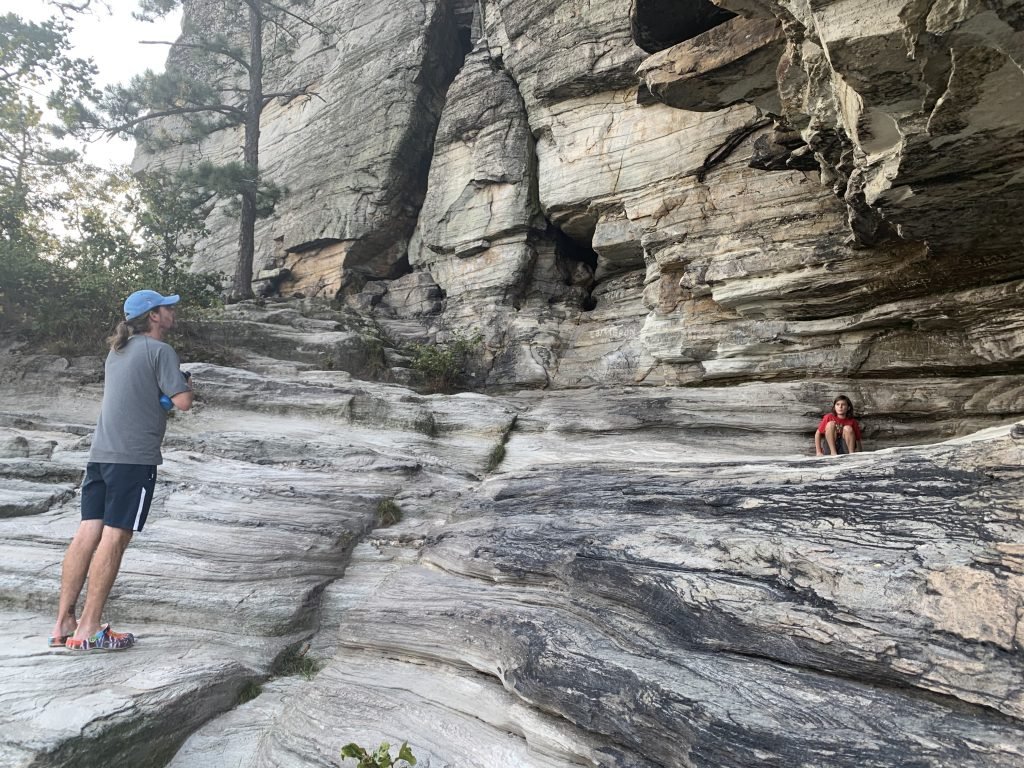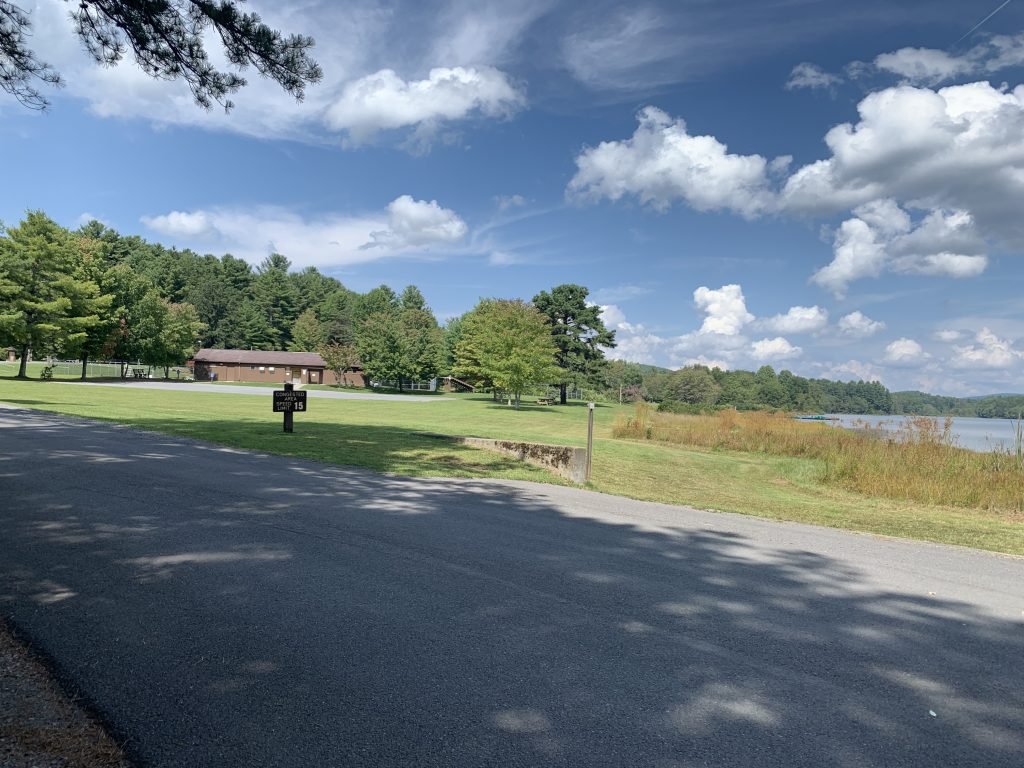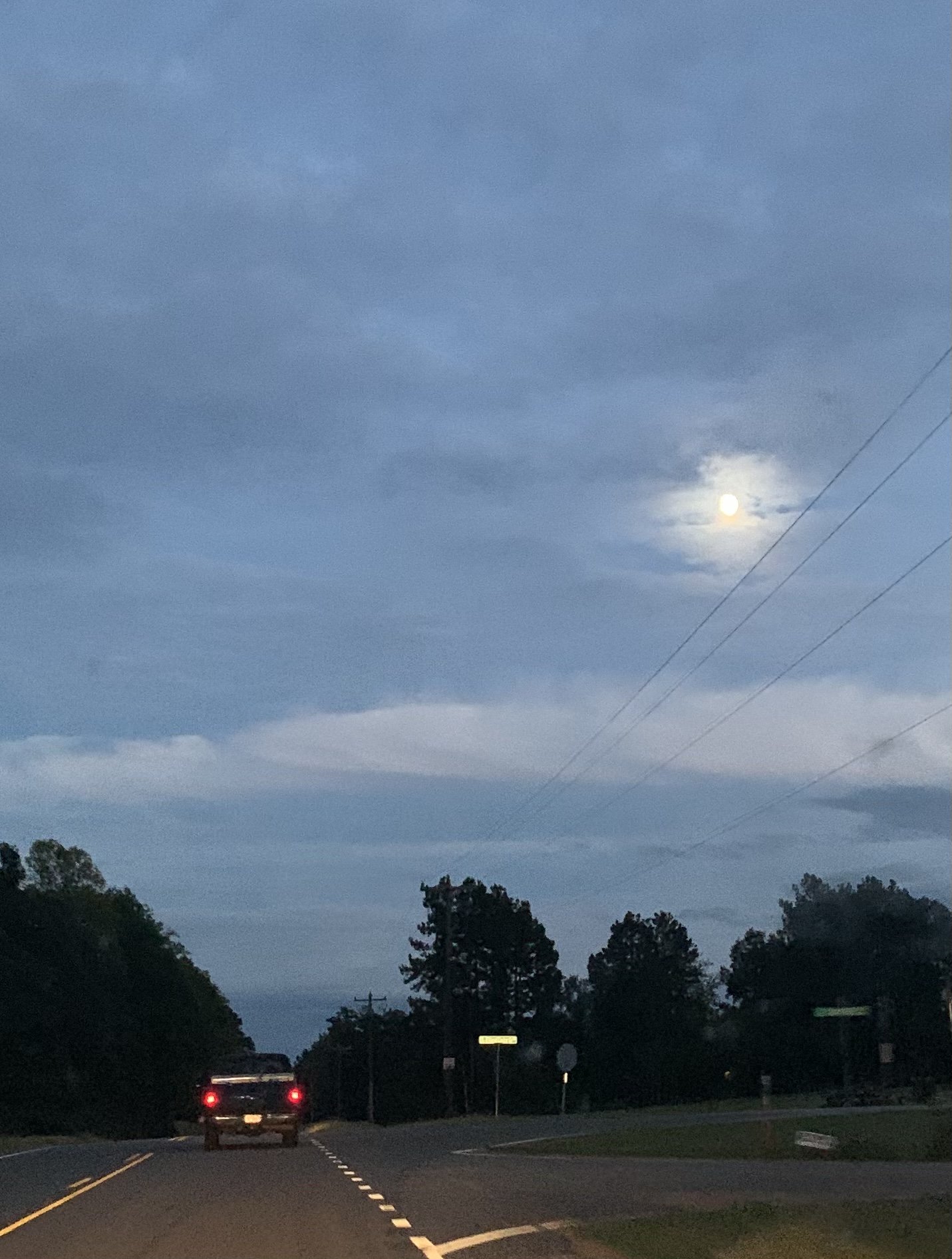Covid Camping and Bear Hounding
About halfway into our 14-day quarantine after contracting Covid (last month), my 11YO was teary after getting off the phone with his college-aged brother. When I asked him what was wrong, he couldn't tell me; he said he'd just been feeling more and more sad. The next day (and the day after that) we spent a couple hours at Duke Gardens (wearing masks and only going to spaces where we could be alone). We hadn't been to Duke Gardens in years and were delighted to find it had expanded into many more magical spaces that we could explore. It was good medicine for both of us and made us realize we still have choices in this quarantine situation.
I had started feeling better by this time. My energy was returning, and my taste was even coming back. Though still smell- and tasteless, my husband had always felt better than me. And, except for feeling sad, my 11YO didn’t seem to be sick at all. But, though our bodies were clearly overcoming the COVID virus, we had all developed a mean case of cabin fever.
We had another couple days of quarantine, then a half-day of school followed by a teacher workday, followed by a Friday. So we booked a night at a secluded campsite at Pilot Mountain, NC, and 3 more nights at Moncove Lake State Park campground near Union, WV. The timing seemed perfect, and we knew the trip would provide a far more engaging educational opportunity for our son than staring at a screen and doing worksheets in our cluttered home. Honestly, we couldn’t imagine a much better way to quarantine on all fronts.
We checked into Jomeokee Campground on our cell phones, and spent a magical evening hiking and camping under the changing visage of Pilot Mountain. There were two small camper vans in the campground as well, but we never saw the folks who owned them (it was the middle of the week, mind you).
The following day, we drove to West Virginia. Since before we left home, our son had been singing and humming "Country Roads" by John Denver to the point, I think, that he was annoying even himself. This didn't keep me from playing it as we drove through the West Virginia Mountains to Moncove Lake State Park; and, despite his complaints, he couldn't help but sing along.
When we got to the Moncove State Park campground, we were surprised by how big it was. The place obviously sees crowds of people during balmy non-Covid months, especially in summer when its sizable and well-maintained pool is open. But, besides a couple camper vans in a separate section up on the hill, we were the only people there .
.
Though it rained every night (and we had a defunct rain cover), we had two and a half beautiful days exploring Moncove Lake and Union/Monroe County.
Wearing our masks and conscientiously social distancing, we happily perused the shelves and bought freshly made sandwiches at Amish-owned Cheese 'n More up the road. I was most intrigued by the rows of rainbow colors and flavors of gelatin, while my 11YO was most excited by the bins of old-school candy lining the main wall.
We stopped by the aging and abandoned Old Sweet Springs Resort. I have an attraction to old multi-residences and this place fit the bill perfectly. It was built in the 1700's as a luxury resort and spa that hosted as many as 800 guests at a time (!), including George Washington, James Madison, Franklin Pierce, Martin Van Buren, Millard Fillmore, Marquis de Lafayette, and Robert E. Lee. After the resort was shuttered in the 1930's, it was used by the state as a tuberculosis sanitorium and later revived as an elder care facility that closed in the 1990's. In 2015, it was bought by an investor with plans to return it to its old resort glory, fingers crossed. Unfortunately, there were "no trespassing" signs and chains across the gravel roads, so we didn't walk around.
We visited the Lost Caverns in nearby Lewisburg, West Virginia, where we explored the underground habitat all by ourselves for the better part of an hour (general tours are self-guided). We perused the gift shop for nearly as long and came away with a personalized pocket knife, a couple of handmade soaps in the shape of West Virginia, and a leather necklace with a bear-claw pendant, presuming the claws were from bears hit by cars, euthanized for aggression, or otherwise discovered dead. Though I'd picked through the necklaces and found the bear claw with the tightest metal clasp, it fell out of the pendant before night fell. We figured Nature had reclaimed what's hers. We'd been hesitant to buy the bear claw in the first place.
On the way back to the campground, we stopped at Rehoboth Church, a log-cabin built in 1786 (with land donated by a devout Catholic!) that is the oldest Methodist church west of the Shenandoah Valley. Though it was closed when we arrived, the resident host happily gave us a most enthusiastic, educational, historically accurate, and empathetic tour of the place at no charge. She pointed out the gun holes around the top of the log cabin, to protect worshippers from the natives; the balcony seating around the top of each wall for women and children and eventually slaves; and gravestones for soldiers from the Revolutionary and Civil Wars. She also informed us that the Methodists invited both Native Americans and the prodigy of slaves that once lived in the area to worship with them and offered their sincere apologies for the wrongs of the past. And she told us, with great pride, that the church is now nondenominational and anyone can use the building and grounds in exchange for whatever amount they are able to donate. Rehoboth Church was probably my favorite place that we visited.
When the person staffing the campground entrance hut appeared (we weren't sure if they were ever going to), we rented paddle boats and tooled around the lake as if it were our private oasis.
.
The opposite bank of the lake was strewn with submerged tree stumps that had clearly been cut on purpose. We became somber as we realized we were in a man-made tree cemetery, but soon we were hemming and hawing at the giant freshwater clam shells scattering the area and the fish that jumped between the dead trees.
.
An internet search later revealed that, like other lakes in West Virginia, Moncove lake is man made. It was built as part of the Moncove Public Hunting and Fishing Area in 1960, by damming Devil Creek in eastern Monroe County. The big sign at the dock makes clear the emphasis is on fishing. Somewhat incongruous to environmental concerns, swimming and live bait isn't allowed, but gas-powered motor boats are. The lake reportedly contains largemouth bass, bluegill, trout, catfish, and walleye, and size and creel (daily catch) limits apply.
.
As we were returning the keys to our paddle boat locks, we heard a commotion of dogs yapping and howling in the distance. We had convinced ourselves that they must be with fox hunters on horseback (hopefully chasing fox scent rather than a live fox). But, as we approached our tent, we saw a group of men with at least 15 dogs between them setting up camp right beside us. We changed out of our bathing suits and tried to recoup at the camp site, while the dogs, which were tied to separate trees, barked and howled. It wasn't long before I couldn't hear myself think.
I walked back to the little building at the entrance of the campground and approached the young woman who had rented us the paddle boats. She was now talking to an older couple who were checking in with their camper van (they were not masked but I was). The young woman explained to me, somewhat sympathetically, that the new folks were bear hunters. I referred to a sign that said the campground was dog friendly but that campers come first. She would not consider even speaking with the new arrivals. I asked the young woman if I could discuss the situation with her manager, and she told me she would ask him to visit our campsite when he returned in 2-3 hours (it was already afternoon, mind you).
Then the older man checking in told me that bear hunting season opened early this year, and you couldn't keep bear hunters from the campground. "Where else are they gonna go?" he asked. They'd be gone most the night, he said - sometimes you have to chase a bear 10 miles or more. But he agreed that the new arrivals should keep their dogs quiet. "I can go up there and shut those dogs up myself," he laughed gruffly, "but I don't think the owners'd like it."
I thought the campground should be more worried about liability if not the safety of their campers, particularly when I later discovered that bear hounds have been known to attack people and other animals (see https://www.citizen-times.com/story/news/local/2015/01/30/camper-injured-hunting-dogs-works-change-law/22584755/ and https://addisonindependent.com/news/legislators-eye-bear-hound-rules-after-ripton-attack).
Here's a photo showing where the men set up camp in proximity to our tents (we are the only people in this section of the campground):
.
The Prius is our car. The men set up camp (and tied their bear-hunting dogs individually to the trees) at the vehicles that my husband (in the tie-dye shirt) is facing.
And here's a video with audio showing just how loud and incessant the dogs' howling was (this was after I talked with the staff member at the campground entrance) to no avail:
.
Play video with speakers on to hear the sound of the dogs carrying on, non stop.
As the hounds howled, I thought about the Confederate flags we drove past on the way here. For a moment, I made myself imagine that we were an African American family, and it scared the hell out of me. We packed up, left the following note, and drove back to Durham, losing the $20 we paid in advance when we completed the online reservation days before.
Note: I grew up riding horses and used to fox hunt, only using scent.
.
Whether man-made or not, we feel lucky to have had Moncove Lake to ourselves those first 2 days. Being alone in Nature is always magical, particularly when water is involved. It's easy to forget about the politics, division, and just plain hate that plagues our country when there's no cell service and the radio is out of range. But those bear-hunting men with their pack of hounds instantly put us smack dab back into American reality.
Determined to make the most of the afternoon before we returned home a day early, we stopped by the Swinging Bridge Restaurant and Store, because one of the locals had told us it was by the river and had a swinging bridge connecting the two halves of the store. We thought the swinging bridge was over the river; turns out it just connects the two halves of the store. As we perused the shop, the items on the shelves seemed to be deliberately telling us it was time to go.
.
As we drove home, I used my intermittent cell bars to read up on America's bear hunting situation. I hadn't even realized that people were allowed to hunt bears in the United States.
I learned that black bears can be hunted in 28 of the 50 U.S. states. Of these, 8 states allow bear hunting in the Spring, when bears come out of hibernation, groggy and malnourished, and are easy targets; in addition, female bears killed during spring hunting can leave orphaned cubs, who may as well be counted among the dead. 17 states allow "bear hounding", or using dogs to hunt bears; and 12 of these permit hunters to train their dogs off season by taking them out to chase bears for miles until the bear either climbs a tree for safety or confronts the dogs out of exhaustion. The hunter is not allowed to kill the bear in the off season, but when a bear's energy supplies are exhausted this extensively late in the year, they may not survive winter hibernation. Furthermore, 12 states allow bear baiting or luring bears with food, including "donuts, candy, grease, rotting garbage, corn, fish, and meat". Only one state (Maine) allows trapping bears using high-pressure metal jaws with teeth, so the bears have that going for them (eye roll). Here's a 2019 chart showing which states allow bear hunting and related practices: https://www.wildlife.state.nh.us/hunting/bear-reciprocity.html.
The bear hunting season was recently extended in West Virginia, accounting for our not-so-pleasant encounter at the Moncove Lake Campground. In fact, another extension is on the way. Furthermore, despite concerns from resident bear hunters, themselves, that "guides would do whatever was necessary to satisfy the customer, even if that included unethical and potentially illegal activity", West Virginia is primed to join the list of states that allow tourists to pay bear-hunting guides. Currently, West Virginia's daily bag limit is one (1) bear per day with a season bag limit of two (2) bears, "provided at least one (1) bear comes from Boone, Fayette, Kanawha, Logan, McDowell, Mingo, Nicholas, Preston, Raleigh, or Wyoming counties."
Though there may be cases where bear overpopulation could become a problem if hunting were prohibited, many states appear to be using population control as an excuse to 1) eliminate the intrusion of bears into human areas occupying what used to be their habitat and/or 2) enable residents and organizations to profit from bear abuse and extermination. In the meantime, the United States government enables states to permit baiting, trapping, and even catch-and-release training with dogs. How can we humans expect to harmoniously coexist with bears when hunters are allowed to lure them with human food and terrorize or kill them? When the bears that escape understandably seek out human food or react aggressively towards humans, we use that as an excuse to kill them just the same.
Upon learning all this, I immediately regretted having exchanged money for that bear claw necklace for my son. It's pretty clear that the claw likely came from a bear that was not only privately hunted, but chased by dogs until it had no choice but to surrender. Nature did rightfully reclaim what is hers. In apology for my insult, I have written and published this article, so that I can shed some light on America's unethical bear-hunting practices and inspire people to oppose them.
———————————
Petition to stop bear baiting in West Virginia: https://www.change.org/p/dave-sypolt-stop-west-virginia-from-killing-bears-over-bait
Petition to stop Springtime hunting of bears in WV: https://www.change.org/p/wv-division-of-natural-resources-give-cubs-a-chance?signed=true
Petition to ban bear hounding in North Carolina (my home state): https://www.ipetitions.com/petition/doghuntingabuse
I can find no petition to stop bear hounding in West Virginia.
_________________
More pertinent links:
West Virginia Bear Hunting Reglations: https://wvdnr.gov/frequently-asked-questions/black-bear-seasons-regulations/ and https://www.beardefenders.org/west-virginia.
Humane bear hunting for population control: http://www.bearconservation.org.uk/threats-hunting/
———————————
To support my blog and other writing and/or advocacy projects, please purchase one of my children’s books for a child (or teacher, day-care, etc.) in your life, whether central or peripheral. I’m happy to do readings at schools, museums, festivals, etc. in exchange for 5 or more book purchases and permission to sell my books if participants request. Thanks for caring and sharing!
Melissa (Rooney)













